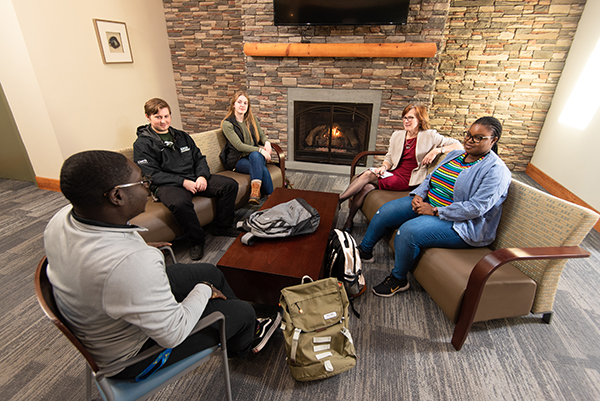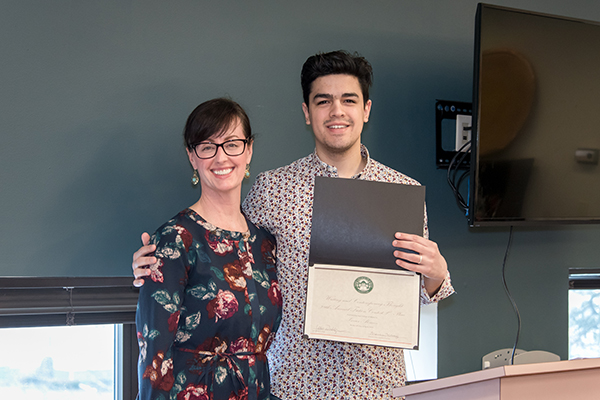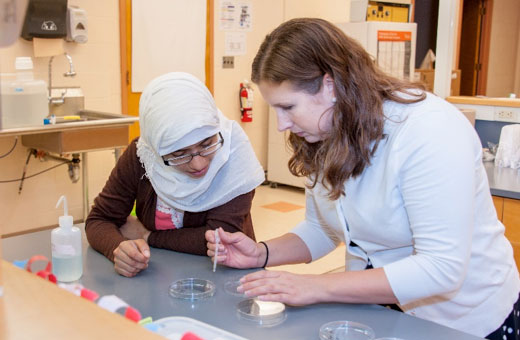NEW General Education Curriculum Promotes Wellness, Intellectual Exploration and Connections to Russell Sage College
When Assistant Professor of Writing and Interdisciplinary Studies Maureen Gokey and Assistant Professor of Biology and Health Sciences Kristi LaMonica became co-chairs of Russell Sage College’s general education task force, they took on an ambitious project with a non-negotiable deadline.
On many campuses – and at Sage in the past – designing, refining and approving a general education program is a years-long endeavor.
Gokey, LaMonica and members of the Russell Sage College general education task force had just a few months to design a general education plan that would be in place by fall 2020, when Russell Sage College’s new configuration as a coeducational college with two campuses will be complete.
“Necessity is the mother of invention but in this case, also an amazing driver of efficiency,” said Deborah Lawrence, task force member and undergraduate dean. “We don’t have any less of a product than if we hashed it out over three years.”

General Education Task Force Member and Undergraduate Dean Deborah Lawrence with students.
INCLUSIVE PROCESS
General education is a curriculum that all students at a particular college take, regardless of their specific major. While it helps ensure an education with breadth as well as depth, it imparts more than subject matter knowledge. General education encourages students to see how knowledge can transfer from course to course and year to year, to appreciate different perspectives and to build the creative and critical thinking skills necessary to thrive in college and in a changing world.
At present, Sage students on the Troy campus complete the Women Owning Responsibility for Learning and Doing (WORLD) gen ed program, and students on the Albany campus complete the Literacies of Connection gen ed program – with different required classes and credits.
The consolidation to one undergraduate program at Sage makes a single general education program necessary.
It was important to the task force that the whole faculty have a voice in the design of the new program, said Undergraduate Dean Lawrence. “An inclusive process takes time, but we kept it at the forefront.”
Over the course of four forums on the Troy campus and four forums on the Albany campus early in the 2019-2020 academic year, the task force solicited faculty feedback on several versions of a new gen ed plan, then used that feedback to fine-tune the proposals until one emerged.
By the end of October, the faculty approved a 36-credit general education program that incorporates wellness, prioritizes intellectual exploration and promotes strong connections within the Sage community.
The new program is consistent with guidance from the Association of American Colleges and Universities and the Middle States Commission on Higher Education.
WELLNESS, BROADLY DEFINED
One signature aspect of Russell Sage College’s new gen ed curriculum is its emphasis on wellness – a subject that colleges are only beginning to address in a comprehensive way, said task force co-chair Maureen Gokey after an AACU workshop on wellness and general education.
Gen ed is made up of Core courses that everyone takes, and Distribution courses that allow students to select from a menu of options. Both the Core and Distribution of Sage’s new gen ed have wellness components.
While particulars are still being worked out, the First-Year Experience (a Core course) will be closely aligned with Sage THRIVE, a college-wide initiative to promote well-being. Students will also select three credits from an array of Distribution courses that relate to wellness. Since wellness takes many forms and may mean something different to every student, classes in a variety of subjects – including mental and physical health, cultural diversity, spirituality, finance and the environment – will count toward the wellness Distribution.
Sage is already doing something that other schools are just starting to do, and in a distinctive way, said Gokey. “A lot of schools are talking about wellness in terms of traditional definitions of physical health, which is great, but at Sage we are hoping to address it in a way that is not so prescriptive, and that is really appealing.”
Sage THRIVE and the wellness component of the new gen ed program respond to increasing amounts of stress reported by college students, said Dean Deborah Lawrence. “By having THRIVE and incorporating wellness into gen ed and the First-Year Experience, right from the start we are providing coping mechanisms, tools and resources for success at college.”
Task force co-chairs Gokey and LaMonica also noted that there is potential for a wellness minor in the future.

General Education Task Force Co-Chair and Assistant Professor of Writing and Interdisciplinary Studies Maureen Gokey with Xavier Rene ’20.
OPPORTUNITY FOR CHOICE
The variety of classes that will count for the wellness Distribution is an example of the kind of flexibility and opportunity for choice that the faculty wanted to build into the Distribution portion of Russell Sage’s new gen ed program.
In addition to the wellness credits, students will select three-credits (typically one course) in each of the following areas: the arts, humanities, natural sciences, quantitative reasoning, social sciences, and an elective from any of these categories, to complete the Distribution requirements.
The Distribution requirements enable students to broaden their knowledge base, said task force co-chair Kristi LaMonica. “It promotes academic exploration and that’s what’s critical about gen ed,” she said, adding that the new model is not unduly burdensome to transfer students or those in high-credit pre-professional and accelerated programs. “We can see that transfers could come in with most of the distribution filled already.”

General Education Task Force Co-Chair and Assistant Professor of Biology and Health Sciences Kristi LaMonica with Saba Abuzaid ’19.
SHARED EXPERIENCES
The Core classes that everyone will complete include a writing sequence, a First-Year Experience, and second and third year signature courses, with Honors sections available.
These components will be designed as “shared experiences” – meaning that all sections will have a common syllabus, assignments and student learning outcomes (For example, students might be assigned to critically analyze a reading on diversity; the particular reading may differ from section to section, however.)
The “shared experience” nature of the Core courses is intended to promote a sense of identity and connection — student to student, student to faculty and student to Sage.
“The cohort in the Core allows students to build ties to the college,” said LaMonica. “It gives students a sense of belonging to the bigger group which is incredibly important.”
This presence of a shared-experience second-year signature course is especially significant said Dean Deborah Lawrence. She references what is informally known as the “sophomore slump,” when the newness of college life is over but the excitement of internships, study abroad and preparing to graduate may still seem far away. “This is a critical time to keep students engaged, continue to provide a sense of identity as a Russell Sage College student and ensure points of contact to address student concerns and persistence issues and to encourage academic growth.”
A GREAT FIT FOR THE EVOLVING SAGE
Since November, Gokey and LaMonica have been working with faculty subgroups and offices including Career Planning and Academic Support to draft the syllabi and learning outcomes for the writing sequence and signature courses, which will be proposed to the curriculum committee this spring.
And once the new Russell Sage College general education program is in place, it will be continually assessed. Director of Institutional Effectiveness Kirk Robinson is involved with the task force’s work to design a sustainable assessment plan.
“It is typical for gen ed to be redesigned in response to a strategic plan, but not typical that a strategic plan makes a new gen ed a necessity, as in Sage’s case,” said Dean Lawrence. “We have students coming in the door and no option to not provide general education, but are we in a place where we compromised? Absolutely not. The Core and Distribution requirements that we have crafted are a great fit for the evolving Sage, and are of the same high-quality one would see as the result of a multi-year effort.”
She, Gokey and LaMonica agree that the alacrity the task force and entire faculty brought to the proposal process suggests that the faculty were ready for a common gen ed program and for the unification of the two campuses in general.
Maureen Gokey described a retreat at which the full task force broke into small groups to draft iterations of a Core curriculum that reflected the Russell Sage College General Education Mission Statement and Program Goals. “When we reconvened, every group had essentially the same ideas. As we transition to the future gen ed, we are all on the same page.”
“It was one of our first big wins,” said Lawrence. “We knew we were building on common ground, and it speaks powerfully to the fact that we are headed in the right direction for Sage.”
***
Special Thanks to the Russell Sage College General Education Task Force
Maureen Gokey
Assistant Professor, Writing and Interdisciplinary Studies, task force co-chair
Kristi LaMonica
Assistant Professor, Biology and Health Sciences, task force co-chair
Deborah Lawrence
Undergraduate Dean
Michael Bienkowski
Associate Professor, Interdisciplinary Studies
William Fillmore
Assistant Professor, 3D Art and Extended Media
Alicia Harlow
Assistant Professor, Psychology
Kate Kagan
Assistant Professor, Spanish
Pamela Katz
Professor, Legal Studies
Stephen Schechter
Professor, History & Society
Stacie Kutz
Associate Dean and Associate Professor, Biology
Dayna Maniccia
Assistant Professor, Public Health
Arlene Mcguane
Assistant Professor, Nursing
Shealeen Meaney
Assistant Professor, English And Modern Languages
Ryan Mitchell
Associate Professor, Nutrition
Tonya Moutray
Associate Dean and Professor, English and Modern Languages
Emilly Obuya
Associate Professor, Chemistry
Patricia O’Connor
Professor, Psychology
Peter Stapleton
Assistant Professor, Physical Education
Russell Sage College General Education Mission Statement and Program Goals
Students who complete the Russell Sage College General Education program will be empowered, informed, participatory citizens in a dynamic and diverse society. Students will develop practical knowledge, as well as creative and critical thinking skills, to thrive in an ever-changing world where multi-layered problems demand innovative solutions
Program Goals
To be: students will develop cultural awareness and engage as citizen-learners who can problem-solve through ethical, evidence-based, and innovative thinking.
To know: students will develop, analyze, and synthesize knowledge to achieve a deeper understanding that will direct current and future inquiry and action.
To do: students will work collaboratively within diverse cultures through civic and professional engagement to facilitate change and positively impact communities.
Russell Sage College General Education Requirements, Effective Fall 2020
Program Core
Writing Sequence
Two courses taken in year one will focus on writing, critical reading and thinking, and research as social processes. The second course will build upon the first, with further instruction in conducting and writing academic research.
First-Year Experience
This first-year seminar course will be anchored by a common theme and expose students to experiences and content that supports college success, including academic strategies; campus resources; finding an affinity group; and wellness.
Year-Two Signature Course: Intercultural Studies
This course explores human diversity and the historical, cultural, global, and systemic forces that shape experiences and world views. This course will also provide another avenue for students to get involved with the Russell Sage College Women’s Institute and Sage THRIVE initiative.
Year-Three Signature Course: Engaging in a World with Multifaceted Issues
Students will engage with in complex problems (such as climate change, food sustainability) to encourage communication across disciplines and cultural boundaries.
Distribution
Students should select three credits in the following categories:
Arts
Humanities
Natural Science
Quantitative Reasoning
Social Science
Wellness
Elective

